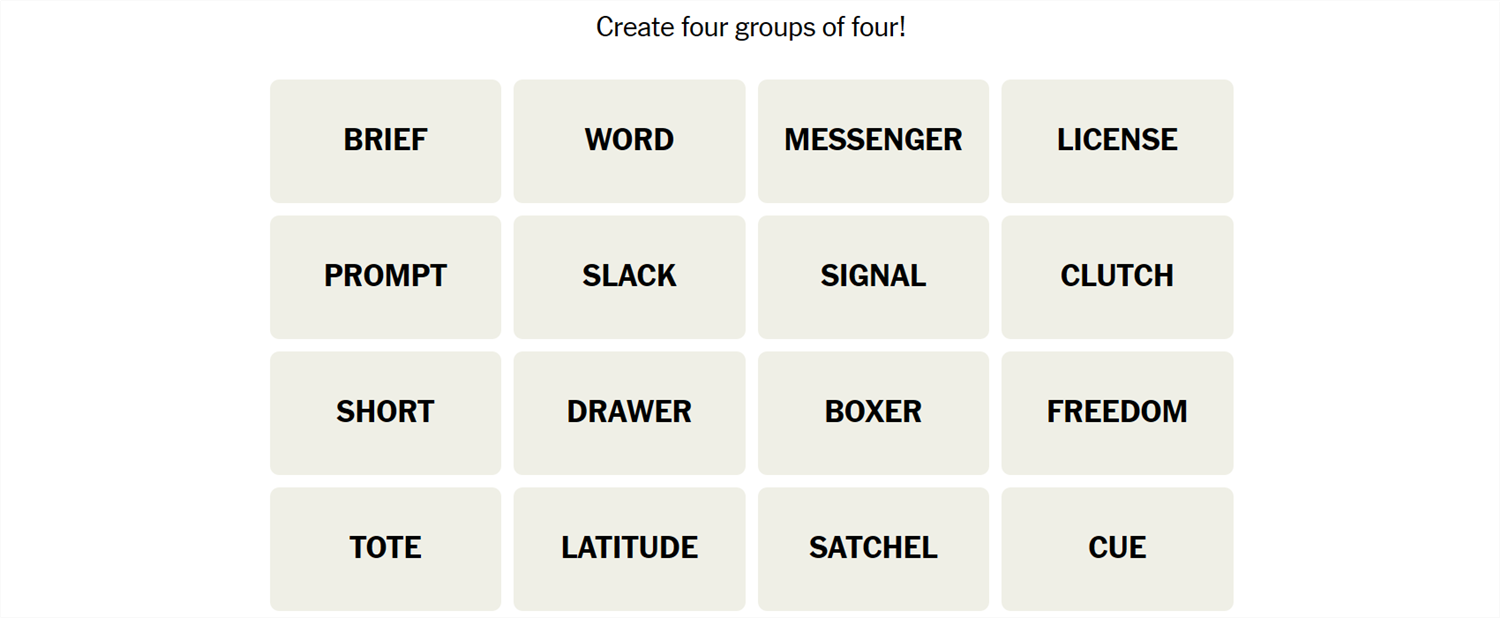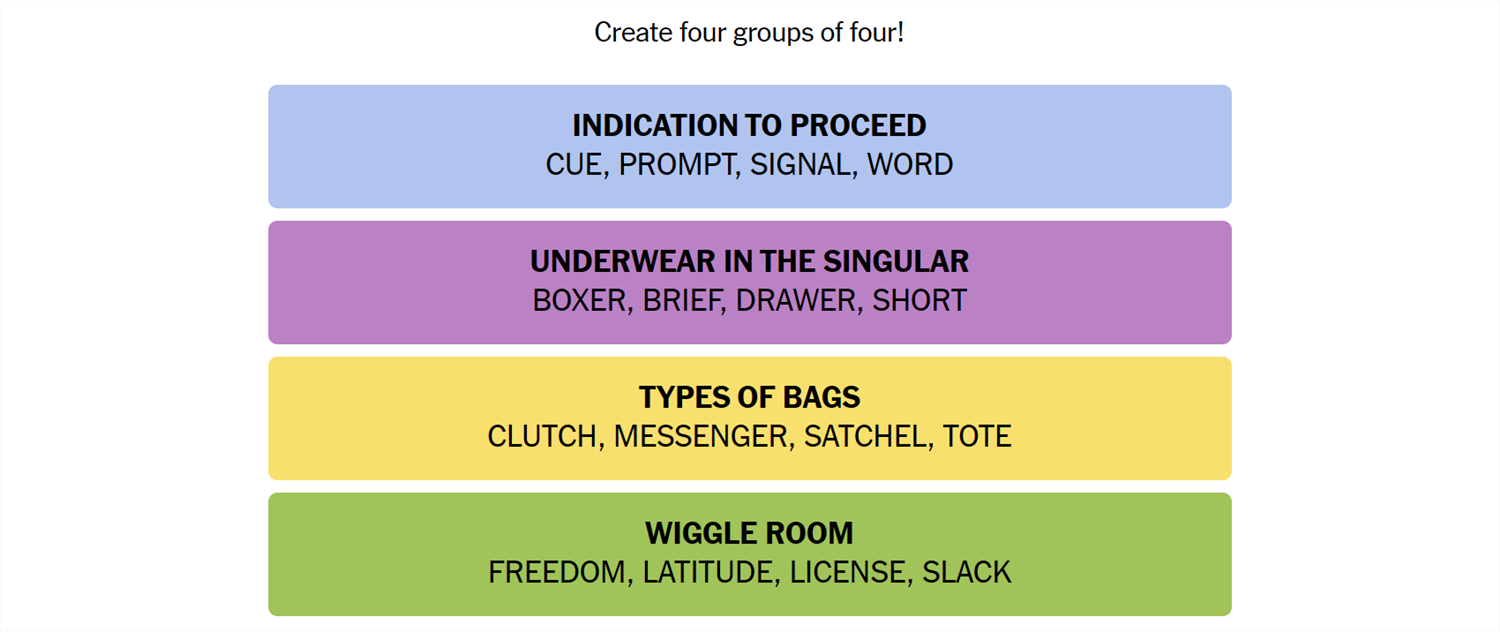June 28 - New York Times Connection Challenge

June 28 - New York Times Connection Challenge #383 Explained
Quick Links
- What Is Connections?
- Hints for Today’s Connections Groups
- Today’s NYT Connections Answers
- How Did We Solve This Connections Game?
- How Do You Guess Connections Groups?
Connections is a game from the New York Times that challenges you to find the association between words. It sounds easy, but it isn’t—Connections categories can be almost anything, and they’re usually quite specific. If you need a hand getting the answers, we’ve got you covered.
What Is Connections?
Connections is a game from the New York Times. The objective is simple: sort 16 words into groups of 4. Each group of words will be connected by some common idea or theme. That common element could be anything. We have seen everything from games that rely on the number of letters in the words to categories that require you to spot an extra letter at the end of the word. Sometimes they’re references to economics, other times they reference fairy tales. There is no telling what sort of association there will be between words.
Once you’re confident you understand the connection, select 4 words, then hit “Submit.” You have only four attempts in total, so don’t be too guess-happy.
Hints for Today’s Connections Groups
Here are a few hints for the 383rd Connections game to get you started:
- Yellow: Something you might wear over your shoulder.
- Green: Also, your margins.
- Blue: To get the go-ahead.
- Purple: Things you wear under your regular clothes.

If you still need help, the actual group names are:
- Yellow: Types of Bags
- Green: Wiggle Room
- Blue: Indication to Proceed
- Purple: Underwear in the Singular
Today’s NYT Connections Answers

Types of Bags (Yellow):
Clutch, Messenger, Satchel, Tote
Wiggle Room (Green):
Freedom, Latitude, License, Slack
Indication to Proceed (Blue):
Cue, Prompt, Signal, Word
Underwear in the Singular (Purple):
Boxer, Brief, Drawer, Short
How Did We Solve This Connections Game?
June 28th wasn’t too bad.
The first word I looked at was cue. It is pretty unambiguous, and means “the signal to start.” You can prompt someone to begin, so prompt seemed like a good pick, and “give the word” is a very common expression related to getting started too. I picked signal as the final word to round out the group, since it can also be used to indicate when someone should begin. Cue, prompt, signal, and word all belonged to the Blue group, “Indication to Proceed.”
Boxer, brief, drawer, and shorts just suddenly popped into my head as “underwear related words” when looking at the list, probably due to the debate that rages around “Boxers vs. Briefs.” They were in the Purple group, “Underwear in the Singular.”
A satchel is a type of bag, so I started with that for my next group. Freedom, latitude, slack, and license make absolutely no sense in the context of “bag,” so I just opted to pick every other remaining word instead of puzzling it out. Clutch, messenger, satchel, and tote belonged to the Yellow group, “Types of Bags.”
That left freedom, latitude, license, and slack. The terms seem vaguely related to the ideas of margin for error, or freedom of movement. Green was “Wiggle Room”—close enough. I count that as a win still.
How Do You Guess Connections Groups?
There is no quick, reliable way to approach Connections like there is with Wordle, since Connections isn’t algorithmic. However, there are a few things to keep in mind that can help.
- Look for similar parts of speech. Are some words verbs and others nouns? Are some adjectives? Try mentally grouping them based on those categories and see if any other patterns jump out at you.
- Are the words synonyms? Sometimes categories will just be synonyms for a phrase, or very close to synonyms. Don’t rely too closely on this, though. Occasionally, Connections will deliberately throw in words that are sometimes synonyms to mislead you.
- Try saying the words. Sometimes, saying the words helps. One puzzle we saw included the words go, rate, faster, clip, pace, speed, move, commute, and hurry—all of which are obviously related to the idea of motion. However, when you say them, it becomes a little more obvious that only four (go, move, hurry, faster) are things you’d actually say to prompt someone to get moving.
- Expect the red herring . Connections usually has words that could be plausibly, yet incorrectly, grouped together. Take the words Bud, Corona, and Light, as an example. You might instinctively see those three words together and assume they’re lumped together in a category related to beer—but they weren’t.
- Look for distinct words. If a word on your board doesn’t have multiple meanings or can really only be used in one context, try using that word as the basis for a category.
- Shuffle the board. Sometimes, moving words around will help you look at them in new ways.
If you didn’t solve this one, don’t feel too bad—there’s always tomorrow! And those words may align with a topic you’re interested in, giving you a leg up on the competition.
Also read:
- [New] 2024 Approved Top Video Watch Counts YouTube's Historical List
- [New] Expert Tips for Cutting and Splicing 360-Degree Footage in Adobe Premiere
- [New] Iconic Lecture Labels Maker Pro
- [New] Unveiling Hidden Gems Essential Tricks for Win11
- [Updated] 2024 Approved Unconventional Techniques for Rewinding Videos on YT
- [Updated] Hue Adjustments Making Your GoPro Footage Pop
- [Updated] Proactive Measures Against Typical Short Video Issues
- 2024 Approved Immersive Worlds Confrontation Metaverse Vs. Omniverse Explored
- A Detailed VPNa Fake GPS Location Free Review On Lava Blaze 2 Pro | Dr.fone
- Free, Individualized Music for Engaging Video Conclusions for 2024
- Harmonious Journey From Picture to Playlist for 2024
- In 2024, Final Flair Free & Paid Templates to Express Thanks
- In 2024, Still Using Pattern Locks with Realme GT Neo 5 SE? Tips, Tricks and Helpful Advice
- In 2024, Top 6 Apps/Services to Trace Any Realme 10T 5G Location By Mobile Number | Dr.fone
- The 7% Superiority of Intel's Core I7-14700K Over Ultra 7 with 265KF Unveiled in Latest Single-Core Tests
- Ultimate Step-by-Step Instructions: Removing Outdated Directories in Windows
- Title: June 28 - New York Times Connection Challenge
- Author: Frank
- Created at : 2025-02-16 17:19:58
- Updated at : 2025-02-19 16:57:39
- Link: https://some-techniques.techidaily.com/june-28-new-york-times-connection-challenge-383-explained/
- License: This work is licensed under CC BY-NC-SA 4.0.